Let's Talk
Libertarians smarter?
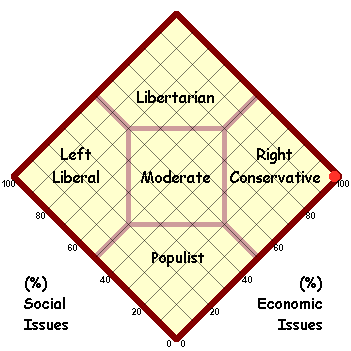
Are liberals really smarter than conservatives? Or are libertarians smarter than anyone else? A recent column in The Daily Mail suggests so. True or not, it shows that “liberal” and “conservative” are not the only two extremes of opinion. In fact, they are special cases of a far more general political landscape.
Traditional political labels
By tradition, “conservative” and “liberal” (formerly “progressive”) stand for two different sets of freedoms on one hand, and entitlements on the other. This linear graph of left-of-center v. right-of-center dates from the National Assembly of Revolutionary France. The only thing that defined the “left” and the “right” then was change. The “left” wanted sweeping change, and the “right” wanted to keep things as they were.
But neither side necessarily stood for more freedom than did the other. Instead, those things that a liberal wants to entitle some people to, a conservative does not. But: many of the things that a liberal wants people to be free to do, a conservative does not, either. The reason: a conservative favors a different set of entitlements that are not economic. The conservative would entitle most wives to expect their husbands to stay married to them, and not seek enjoyment elsewhere or end the marriage whenever they saw fit. “Moderates” are more likely to grant more entitlements in some areas, and more freedoms in others, than either side.
But this line is a very special case. In fact, the possible mix of entitlements and freedoms should have at least two dimensions, not merely one. Michael Hanlon of The Daily Mail came close to recognizing this:
The problem here is how we define ‘left’ and ‘right’ thinking, what this means socially and politically. A moment’s thought shows that the fault lines are not only blurred but they are legion, criss-crossing across traditional political strata and have changed through time.
True, but incomplete. Many theorists, from Rand to Rothbard, have recognized two different “freedom scales” with which to chart one’s attitudes. One is the economic scale. Zero on this scale is a complete command economy, with input-output analysis dictating who produces what, and with Five-Year Plans, government stores, collective farms, the whole nine meters. At this end of the scale, everyone is entitled to a minimum economic standard but are free to do nothing to break out of that standard, or to take on any task unless the authorities approve.
One hundred on this scale is total capitalism, with no role for government in production, distribution, or exchange. At this end, people are free to do anything but entitled to nothing. Whatever they want, they must work for.
The other scale is the social scale. Zero on that scale means: throw homosexuals in prison, punish criminals severely, forbid immigration (that is, membership is by invitation only), etc. One hundred means to let everybody in, take all comers, let roommates (same-sex or opposite-, whether they share bed or not) form whatever contractual unions they care to form—but also recognize freedom of association (including the freedom not to associate), and the right of self-defense.
Hanlon loses sight of one thing: many “social liberals” are damnably hypocritical along this line. They will not recognize freedom of association. They do not recognize a right of self-defense. They do not recognize any of the flip sides of increased tolerance of homosexuality, adultery, or criminality. As an example, they want to leave two men (or two women) free to be intimate, but then want to entitle this roommate pair to rooms, or an apartment, in any dwelling, whether the would-be host wants to offer them those rooms, or that apartment, or not. Once again: one person’s entitlement is another person’s loss of freedom.
[ezadsense midpost]
A libertarian, by contrast, would respect that host’s freedom. A libertarian would ask that the government leave those roommates free to be as intimate as they please, but not entitle them to rooms or apartment wherever they wish. For those, they must still make a voluntary arrangement with a host or landlord.
If one plots his attitudes on the economic and social freedom scales on a square grid, instead of on a line segment, and orient this grid like a baseball diamond, then that grid will yield five different positions, not three. Home plate (zero, zero) is populism, or the Communism of the old Warsaw Pact, or Nazism in Germany. Conservatism lies at first base (100, 0). Liberalism or left-wing-ism lies at third base (0, 100). “Moderate-ism” is at the pitcher’s mound (50, 50). And Libertarianism is at second base (100, 100). So the old left-to-right line passes from third base to first, across the infield, allowing more freedom in economic areas, but insisting on more entitlement on the social, as it goes.
Here is what Hanlon noticed: intelligence tracks with moving straight up on the political grid, and then tending toward perfect libertarianism. Lower intelligence tracks with falling straight down on the political grid, toward total populism. With the horizontal movement along the traditional left-right line, intelligence does not change.
The implied result: Libertarians are smarter than everyone else.
Are libertarians smarter than everyone else?
Purely abstract intelligence might track higher with libertarianism. That makes libertarians smarter than liberals or conservatives on that scale. A smart person (unless he hungers for power) wants to be free, either to make a living or to associate (or not) with anyone he pleases.
But does common sense make libertarians smarter? Not necessarily. Abstract libertarianism works fine—for a voluntary association of voluntarily consenting adults. It does not work well for children. A child is an inherently dependent, even helpless person. Common sense demands that a society entitle a child to food, water, shelter, and education, that the parents, not the government, should give it. The parents are more likely to have the child’s best interests at heart than faceless bureaucrats would. But in addition, that same society also entitles the parents to a minimum level of “good examples” from other adults.
That is why a sound society does not authorize two same-sex roommates sharing bed to adopt children. It is also why a business that caters to “the prurient interest” is not free to locate near enough to where a child might stray within sight. It is why a sound society classifies certain kinds of pastimes as “for adults only,” and recognizes a class of citizen or resident called the minor. As in:
Sales of cigarettes to MINORS are FORBIDDEN by law. We support this law. Parents are urged to help prevent violations.
The pure libertarian recognizes no such thing as a minor. That’s the equivalent of expecting a cub in the wild to fend for himself before he is ready. As any wildlife biologist knows, that’s not very smart.
But in matters of pure economic policy, libertarians might be smarter than most. A sound society does let its children imitate the adults in one key area: business. Whether this business is selling lemonade from a front-yard stand, or offering lawn-and-garden services to his neighbors for a fee, a libertarian would have no problem with this. Nor would a conservative, so long as the child is doing something that he or she has already safely done at home. But a liberal won’t allow this. A liberal wants to entitle a perfect stranger to sell lawn-and-garden services, usually for a higher fee, without having the neighbor’s boy (or girl) compete with that service. The same seems to hold for selling lemonade, though that is even harder to justify. This makes both conservatives and libertarians smarter than liberals. They are smart enough to know that some entitlements have no justification, but only excuses.
Summing up
Are libertarians smarter? In some areas, yes. In others, no. But conservatives are smart to engage libertarians in a debate on how a society ought to run. Liberals haven’t done very well. Libertarians and conservatives might each be able to teach the other something.
Related:
[amazon_carousel widget_type=”ASINList” width=”500″ height=”250″ title=”” market_place=”US” shuffle_products=”True” show_border=”False” asin=”1935098292, 0061956937, 0345521862, 1596986255, 1596986247, 0446572829, 1439187193, 1596986492, B004NSVE4G, 0307353486″ /] [ezadsense leadout]
[ezadsense leadout]
Terry A. Hurlbut has been a student of politics, philosophy, and science for more than 35 years. He is a graduate of Yale College and has served as a physician-level laboratory administrator in a 250-bed community hospital. He also is a serious student of the Bible, is conversant in its two primary original languages, and has followed the creation-science movement closely since 1993.
-

 Guest Columns4 days ago
Guest Columns4 days agoData Centers Are a Repeat of History in PA’s Coal Region
-

 Executive4 days ago
Executive4 days agoWaste of the Day: Secret Settlements get Taxpayer Money
-
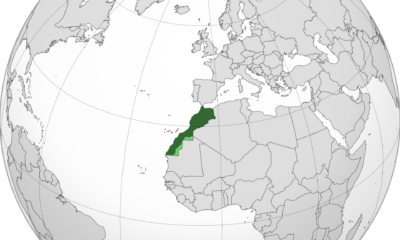
 Executive5 days ago
Executive5 days agoWaste of the Day: Throwback Thursday – Americans Lead Moroccan Pottery Classes
-

 Civilization4 days ago
Civilization4 days agoThe Northwest Passage Will Be Decided by Capability, Not Law
-

 Accountability14 hours ago
Accountability14 hours agoWaste of the Day: Principal Bought Lobster with School Funds
-

 Constitution5 hours ago
Constitution5 hours agoTrump, Canada, and the Constitutional Problem Beneath the Bridge
-

 Civilization3 days ago
Civilization3 days agoThe devil is in the details
-

 Executive2 days ago
Executive2 days agoThe Israeli Lesson Democrats Ignore at Their Peril

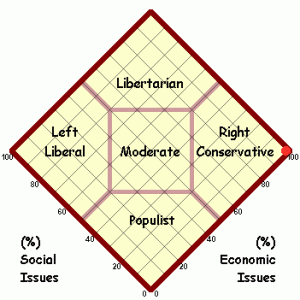








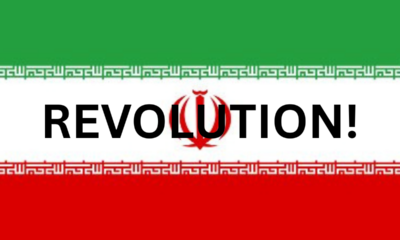



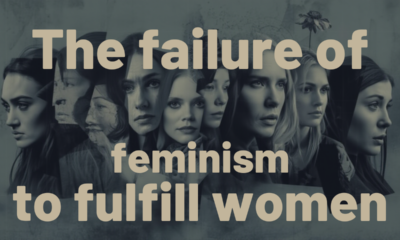

The left/right political scale or spectrum is a farce to cause conflict amoungst the people.
What the “traaditional” scale should be is not Liberalism vs Conservatism but rather a range from no government control to full government control.
link to stephenpratt.net
Hence the square. But I’m working on a better idea: a cubic grid that breaks out the police and the military from other elements of the OnTheIssues.org “social” scale.
Hey, this is an excellent article.
I do have a couple comments; are you equating smarter to intelligence? Intelligence does not always equate to common sense, and I think this may be a big factor.
I read an article (don’t remember where)that showed Ron Paul’s score on the above test scale. I actually scored higher on that test as a libertarian than he did, but I don’t rate myself in the same league as he in intelligence if you are considering his accomplishments.
My first wife was classified as genius, had a photographic memory, was politically active and was short on common sense as she let emotion rule over reality, but still ranked as a libertarian (barely) on that test(??).
If you have read the Federalist and anti-Federalist Papers, you have to conclude that most of our founders were libertarian, and our Constitution is a very libertarian blueprint.
Unfortunately most people mistake the two party paradigm as a left/right, liberal/conservative condition, but the fact is they are really just the two sides of the same evil coin, ruled by the special interests of the oligarchy of banksters and big corporate monopolies.
This should be obvious to anyone that follows history, especially the last century. Also coincides with the timeline history of most societies/governments of history.
http://www.ratifyconstitution.com
I emphasize that “intelligence” in the article means only “that capacity for abstract-reasoning tasks that the most sophisticated intelligence scales capture and measure.” This includes the Wechsler Intelligence Scales for Children (WISC) and Adults (WAIS).
“Common sense” is that skill set that people acquire in the real world, and the inferences they make while acquiring and applying those skills. As I said in at least one other article, I don’t know of any test that measures that.
The usual intelligence scales, I maintain, predict motion in the Libertarian v. Populist direction. The common-sense scales move one toward the Conservative corner. My guess is that the best policies will be somewhere in-between.
Soon I’ll have another article proposing a new cubic grid, with a third axis—the Military and Police Axis—perpendicular to the first two. Zero on that scale will describe a completely militarized society, with an army of conquest abroad and a paramilitary uniformed force at home. The Gendarmerie, the Carabinieri, the Mounties, and American SWAT Teams would be examples of such forces.
One hundred on that scale would mean the absence of any organized police or military. Defense would be strictly by a militia, under the command, if you called it that, of a Committee of Safety. Policing, or the equivalent, would be in the hands of a voluntary neighborhood watch. Which is what they have in Detroit, I understand, but only because city government there has failed completely.
[…] novelty-seeking. Unconscious Reactions Separate Liberals and Conservatives: Scientific American Libertarians smarter? | Conservative News and Views Being a Libertarian, I'd like to think we are the best of both sides. Libertarians tend to: – be […]